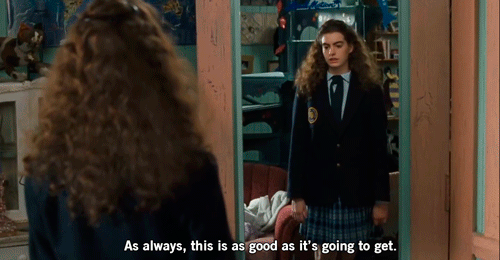You open your email one December evening to see a new unread message from your dream college, with “Your Application Status” in the title, screaming at you in the characteristic bold letters that indicate a message that has yet to be seen.
You’re caught off guard but you take in a breath and click on it. You glance at the first five words of the letter and immediately look away. “We regret to inform you…” is displayed legibly in your mind even when you shut your eyes. You had worked so hard on your application, put so much thought into the essays, made sure to extensively participate in a collection of extracurriculars, and worked hard on your grades and standardized test scores, just to see those five words and be burdened with the responsibility of having a new plan.
It happens. It’s common. And it’s okay.
You know how hard you worked, and best way to approach this situation is to let go of it and move on. It may be easier said than done, but it’s worth it. Just sit back and take each of these doses of optimism and advice with a cup of hot coffee.
1. Reward yourself for taking the risk
![]()
Remember that you didn’t lose anything. Your life is still the same. It’s still the same, wonderful existence (regardless of tough times) that involves froyo with your best friends and festive holiday dinners with family. You took a chance to better yourself, but did this experience actually take anything away from your life?
You may argue, “This rejection took away an opportunity.” We don’t believe you. You have chances to transfer to your dream school after a couple of undergrad years. You could even opt for grad school at your dream college in the long run!
“You are meant to be where you are meant to be,” says Kayla Lewkowicz, a 2014 graduate of Colby College. “I got rejected from my first choice school but had an amazing wonderful college experience at another school and I would never go back.” You are meant to accomplish great things, but perhaps in a different route from the one you were planning.
So don’t ever say you lost an opportunity when there are many chances for you to explore. And if you’re really devoted to your Early Decision school, don’t let go of the possibility. There are always other ways to chase your aspirations. But for now, the big success is the step you took to take the risk on your first college application.
2. You can’t change something beyond your control, so don’t dwell on it
![]()
It is a waste of time to think about something you can’t go back and change. Don’t spend time telling yourself, “I should have taken the ACT one more time” or “I should have written my essay about something else.” You can think of all the things you “should have done,” but can you create a legitimate plan that will let you change the past? Instead of channeling the “should have, could have, would have” thoughts, direct these sentiments towards answers to a more practical question: “What can I do differently on my next applications?”
We have gathered a few expert opinions on college admissions to give you a few ideas.
“Even if a student shows demonstrated interest, submits a well-thought out application and meets the school’s academic criteria, they can still be rejected from a school. If this happens, students shouldn’t get despondent. There are so many amazing colleges and universities in the US, and many can be the right fit,” says Dr. Kat Cohen, founder and CEO of IvyWise (an educational consulting company). Dr. Cohen is among the leading independent university admissions counselors in the world, who also specializes in counseling students who wish to attend highly selective universities, transfer students, and international students.
Dr. Cohen emphasizes the importance of expressing interest in your prospective schools. “Students should treat every college they apply to as their top-choice.” Additionally, “Colleges/universities want to maintain high yield rates, so they want to know that a student is likely to attend that school if they are admitted. What I see most is students not presenting their best self to the admissions committee. Either not being themselves and trying to make themselves into the applicant they think the college wants to see, or not spending enough time crafting compelling essays. Laziness can really hurt your application.”
For those final touches on your next batch of applications, consider campus visits, study up for you interviews, and really let your interest show through in your application essay. Think of ways you can academically and socially contribute to the environment of the school.
Through further research, you might end up dreaming about a different school a few weeks down the road. “My senior year of high school, I was dead set on going to Syracuse, so I applied early decision,” says Rachel Petty, a junior at James Madison University. “I ended up getting deferred to regular admission, and in the block of time before regular acceptances came out, I decided I wanted to go to James Madison University. I didn't end up getting into Syracuse, but it was for the better! I'm extremely happy at JMU and I took it as a sign that I wasn't meant to be at Syracuse.”
Heather Parry from Parry College Counseling (a Seattle-based college counseling company) expanded on the significance of demonstrated interest on a college application. “Demonstrated interest is becoming more and more important in the college application review process. This is the extent to which the student interacts with the college before applying.” According to Parry, you need to ask yourself if you “understand the college's mission and social culture,” as well as whether you would “be a good fit on that campus, become active leaders, and graduate on time.” The power you have is in the research you do. “Colleges want students who will be successful on their campuses, and they also seek to admit students who are most likely to say ‘yes’ if offered admission. These days, GPA and test scores aren't the only factors at play,” adds Parry.
It is also important to demonstrate your interest for your prospective field of study (unless you are undecided), according to independent educational consultant Colleen Ganjian, “For any student with particular career aspirations who plans to pursue a pre-professional course of study, it is very important to show demonstrated interest in that field during the application process. There are very few schools [that] will accept a prospective engineer who has not shown a strong interest in STEM, for example. This would be the case at any college.”
Dr. Cohen suggests applying to 10 to 13 schools, “all of which are the right academic, social and financial fits for [you],” She also advises having “a number of ‘reach,’ ‘target,’ and ‘likely’ schools on their list. Each school on the list should make [you] excited.”
Think about your college shortlist for the next round of applications. How passionate are you about them? If you aren’t passionate about them, find reasons to be or modify your shortlist. Don’t fake demonstrated interest. Do what you can to find your fit.
So what exactly does it mean for a college to be a “fit” for you, despite your numbers and qualifications? Bring on college application truth #3.
3. Your situation doesn’t mean you’re not “qualified enough”
![]()
TBH, your rejection might not even have to do with your performance on exams and courses. According to Dr. Cohen, “Colleges have institutional needs that vary from year to year. While students can’t control what a specific school is looking for in a given year (an astrophysicist, an opera singer), but they can demonstrate how their passions, grit and perseverance make them unique.”
Your situation also has to do with whether the college was the “perfect fit” for you. An admissions officer may read your essays and imagine how you would feel in the college’s environment. Each college has a distinct culture, and if your aspirations don’t align with the customs of the school, you might not get in--even if you have excellent standardized test scores and high school credentials. For example, if you are a student whose primary goal is to become a doctor, you’ll want to go to a “pre-professional”-oriented school. If you apply to a more intellectual/philosophical environment, you may have a lower chance of getting accepted.
Depending on your school and intended major, you may be placed in a more competitive application pool than if you were to pursue a different major.
“One reason that a student with ‘good numbers’ may be rejected from a university is that they are applying to a department that attracts a larger proportion of the applicants,” says Dr. Alfred Poor, a speaker and author of 7 Success Secrets That Every College Student Needs to Know. “Declaring a major—or even an interest in a given field—may put the candidate in greater competition for an admissions slot.”
For instance: if you want to major in chemistry, but apply to a school that is renowned for its chemistry program, the competition may be more stiff than if you were applying to that same school with a different major. “Picking a university that has lower enrollment in the target department could increase your chances of getting admitted (but this then raises questions about the quality of that particular program, if others aren't applying to get into it),” adds Dr. Poor. “At some schools, you can increase your chances of admission by not expressing any preference for a field. You do run the risk of not being admitted for a particular major once you get there, however.”
Similarly, Ganjian made us aware of what checking that “Pre-med” box may indicate. “An applicant checking the box on an application that indicates an interest in a pre-med curriculum will almost always make things harder for herself...A prospective pre-med student is automatically subject to much more competition among a select group of very intelligent students.”
Besides academic fit, admissions officers will consider your preferred college environment. “If a student applying to a large university writes in his or her essay about how much they love being part of a small campus community, then that student isn’t going to necessarily be the best fit – admission officers pick up on that stuff,” notes Dr. Cohen.
Brie Davis, a freshman at Ryerson University, was rejected from her first-choice school. Though she was initially heartbroken, she looked past the obstacle by focusing on the positives. “This is only one school, [and] it does not define my success,” she says. “I realized that there was a reason why I didn't get in. It wasn't because I wasn't good enough; it was just because this school wasn't fit for me. Because I applied early decision, I still had a few months to apply to other dream schools and ones that could really fit me better than my original school.” Having a first-choice school doesn’t necessarily mean it’s the one and only school for you. Use this situation as an opportunity to explore the many choices available to you. Treat your Early Decision outcome as a reset button. The biggest takeaway is to move on (though it may be easier said than done) and show the same enthusiasm for new schools that you showed on your first college application!
4. Many successful people have failed before achieving eventual greatness
![]()
J.K. Rowling was rejected by twelve publishers before Harry Potter became published, in addition to being nearly penniless and raising a child on her own. Stephen King’s first novel Carrie was rejected thirty times before he became a published author who has sold over 350 million books all over the world. Oprah Winfrey was fired as a television reporter because she was “not suited for television.”
What do they all have in common? They didn’t give up after one, two or three rejections. So when you continue your next round of applications, complete them with the same amount of care and enthusiasm as you did with your Early Decision app. Don’t lose motivation because of this one slip.
5. No matter what school you go to, you will still experience “pseudo-adulthood”
![]()
Remember that whether or not you get into your dream school, you’ll experience the following at the college you’ll end up going to:
- You will make amazing friends and connections.
- You will discover your interests and develop your talents.
- You will experience finals week, just like every other college kid in America.
- You will be challenged.
- You will still get to call your mom to ask her whether it’s okay to wash your white-and-green striped shirt with your whites.
- You will get to pursue cool projects or even study abroad!
- You will have a blast. (And if you don’t, there are always other options.)
“Keep telling yourself there are other chances in life, and other experiences that are just as amazing,” says Brie. Because let’s be real—the juiciest apple on the tree might not be the one you have been trying to pick.
![]()
Your rejection cannot necessarily be attributed to your academic stats. It also has to do with how much interest you showed to your dream school, as well your career aspirations you shared with the admissions officers. It turns out that your admission depends on the demographics of the entire application pool. You are enough. But admissions officers make the best assumptions they can to determine if you can thrive at that university, and if it is an ideal academic and social match for you. It’s not about ability; some of it has to do with what admissions officers believe would be best for its applicants. It’s like buying a birthday present for someone you don’t know well. You do your best to guess, but sometimes the recipient doesn’t end up liking the gift.
Things may seem tough now, but just think of it as a small blip in the grand scheme of your life. Getting rejected from a college is of miniscule significance in the long run. What makes the long-term significance is how you handle the resources and opportunities available to you. Make do with what you have, because a rejection letter is not a reflection of your abilities.



































































































